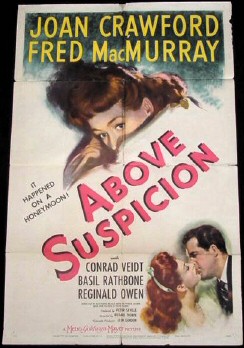
ABOVE SUSPICION
US, 1943, 91 minutes, Black and white.
Fred Mac Murray, Joan Crawford, Conrad Veidt, Basil Rathbone, Reginald Owen, Felix Bressart, Richard Ainley.
Directed by Richard Thorpe.
Above Suspicion is based on a story by Helen Mac Innes. A celebrated novelist, comparatively few of her novels have been transferred to the screen. During World War Two another story, Assignment in Brittany, was filmed. In the late '60s there was a version of The Salzburg Connection.
Joan Crawford is the star, playing with rather a light touch. In this she matches Fred Mac Murray. Conrad Veidt is surprisingly on the side of good. Basil Rathbone, however, turns out to be a sinister Gestapo type.
The film is typical war propaganda adventure - done for entertainment and this is why the film still stands up as light entertainment even more than propaganda. Direction is by Richard Thorpe. (There is an assassination during a performance of a Liszt piece - anticipating the murder in Alfred Hitchcock's The Man Who Knew Too Much.)
1. An entertaining spy story (with reference to Hollywood spy stories)? War entertainment? Propaganda?
2. MGM production values, black and white photography, studios for England and Germany? The musical score - piano concertos, the use of Liszt? The stars?
3. The work of Helen Mac Innes, her popularity as a war and spy novelist?
4. The focus on Frances and Richard? The Oxford background, America? The wedding? The jokes at Oxford, going on the honeymoon, the hotel and calling themselves Mr and Mrs Smith? The irony of their being found out by the Foreign Office? The discussion about the mission, Richard's serious attitude, Frances's playful and exciting attitude? The discussion with the Foreign Office man?
5. In Paris, the cafes, the spilling of the liqueur, the key words? The possibility of the waiter, the head of the hotel? Instructions being given? Going to Germany? Going to the bookshop, the book owner? The woman working in the shop? The continued clues? Seeking out accommodation? The sinister-seeming guide - and the irony of his being on their side? The hotel proprietor, her hesitation, the book on Liszt? Thornley and his presence in the hotel?
6. The concert, Richard meeting his friend from Oxford days? His mother? The concert, the curt friendship? Thornley's presence - and the explanation of his being there? The assassination during the Liszt music? The interrogations? Frances and Richard getting away, supper with their friend's mother?
7. The further clues, the doctor, the chess pieces? Encountering their friend - the irony of his being Gestapo, the doctor tied up, making his escape? Richard and Frances getting away? The pursuit by the Gestapo? In the mountains?
8. The encounter with the sinister guide, his helping them, the comedy at the dance with Richard in disguise? Frances in disguise, Thornley helping? Being found by the Gestapo, imprisoned, tortured and interrogated? The raid and setting Frances free? The death of the Gestapo agent?
9. The disguise as Germans, going to the Italian border - their almost not getting through? Freedom?
10. Frances and Richard as cardboard characters for the sake of entertainment and espionage? The Gestapo, the Austrians, the Germans, the Foreign Office, Secret Service, German secret weapons? Popular espionage ingredients of the '40s?